Howdy, nomad! There comes a time in every wanderer’s life when they start questioning their motorized movements. When they start to pine for something more stable…
And that’s when they start to ask: “What states allow full-time RV living if I got my own piece of paradise?”
Phew boy—the life of a full-time RV resident. Now that’s a rabbit hole! I’d like to say that The Land of the Free is flexible and lenient towards alternative living. Unfortunately, it’s none of those things!
Regulations are rigid. The legalese is dense. Homeowner Associations, property developers, and local governments NEED their suburban stores of value.
What’s that? You still want to find your slice of minimalistic paradise and live in an RV full-time?? A nice, little plot that’s all yours, and the man can never say otherwise…
I would expect nothing less from a maverick like you!
Take my hand, nomad: we’re going on a journey. HOAs will be deconstructed. Real estate agents will cry into their $400 mulberry silk pillows over all the commission we’re NOT giving them.
It is possible to smash the trappings of this uniformity-driven mess we’ve landed in. As always, RVs are the answer to a simpler, better life.
This is exactly where you can and can’t live in an RV on your property full-time in the USA.
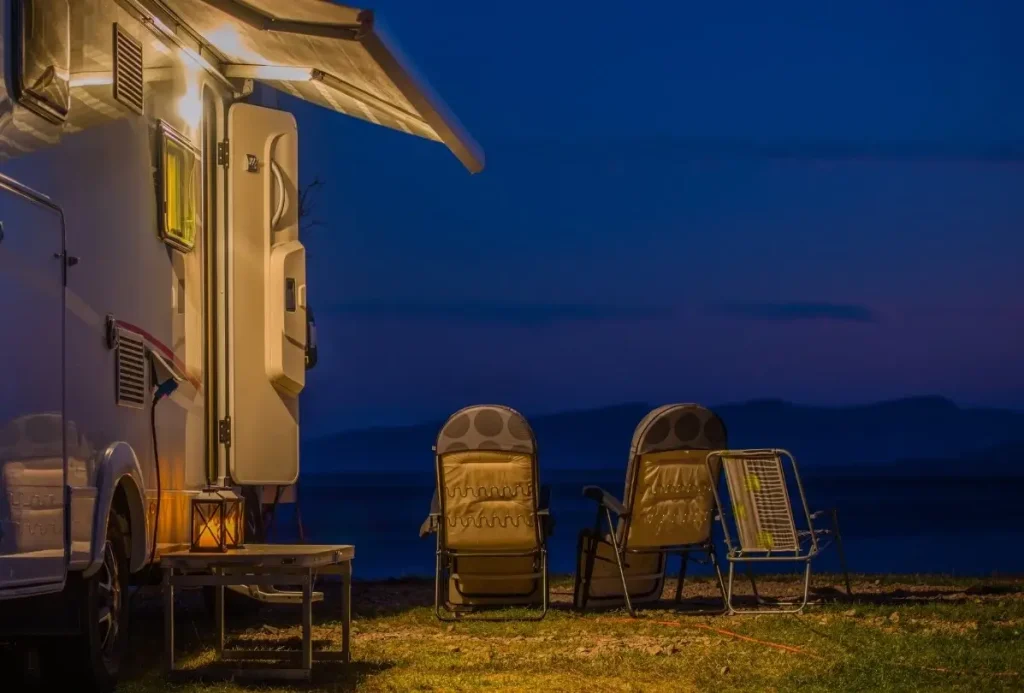
In What States Allow Full-Time RV Living? (An Overview)
Ok, so real quick, before we can get to the states in question, we need to talk details. Specifically, we need to discuss legal divisions within governmental authority.
(Yay.)
Generally speaking, policies governing RV-living on private property are NOT state matters nor governed by state laws. They are usually regulated at a local council level under the jurisdiction of local ordinances and zoning laws. This means things are a helluva lot more complicated to decipher. But it also means it’s a lot easier to find your local representative and provide a significant “contribution” to their cause!
But let’s leave creative forms of persuasion at the door, shall we? Instead, let’s examine more broadly how RV-friendly states are, particularly as it pertains to full-time RV residency on private property. After that, we’ll dive deeper into those pesky local laws and regulations standing between you and your private land utopia.
For assessing the 50 states, I’ve broken things down into three wider categories:
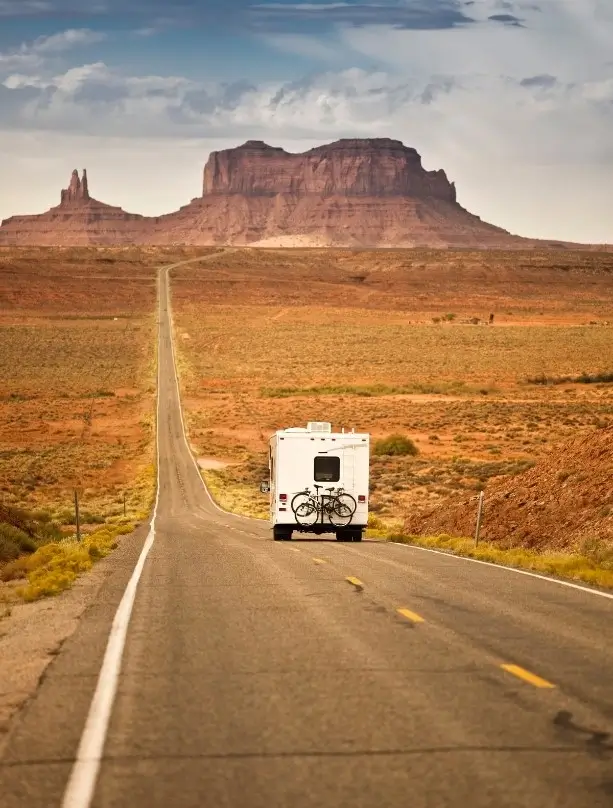
- States Where It’s Generally A-Okay. These states are known for being welcoming to the RV life. They often have the most relaxed regulations on RV-living, especially in rural areas. Overall, these states are where it’s generally easier to live in your RV full-time, sometimes even being widely open to boondockers and long-term dispersed campers.
- States Where “It’s Complicated”. These states are classic situationships for full-time RVers, complete with messy Facebook relationship statuses. You’ll find pockets of RV-friendly regions away from urban areas in these states. But there are also a whole bunch of regions with strict county regulations and utility requirements.
- States Where It’s Generally Not Allowed. In these states, you’ll more than likely have to park up in an RV park or mobile home community. Most local government authorities will strictly prohibit you from using an RV as your permanent residence.
All that said, these are the generalizations per state. Ultimately, it’s the local zoning laws—and your local municipality’s various other ordinances—that dictate whether your RV dreams are a boom or bust.
This guide will give you a broad sense of where to start planning your semi-offgrid piece of paradise. But then you’ll need to dig into local regulations for the full picture.
States Where Full-Time RV Living On Your Property is Generally Permitted
Let’s look at those RV-friendly states. If you’re looking for a place to settle down in your RV without mountains of red tape, you’re in luck! Some states do it right.
For example, Texas, Florida, and South Dakota are a few strong mentions leading the pack for full-time RV life. These states are known for their lenient zoning laws, lower taxes, and more laid-back lifestyle in wide-open rural areas. You’ll find a lot of options where you can park your rig and live full-time without much hassle, so long you’ve got the essentials for comfortable RV living.
States such as Nevada, Alabama, Missouri, and Montana also shine for RV enthusiasts. In these locations, rural counties tend to have minimal zoning restrictions. They often allow for RVs as primary residences, especially on larger parcels of your own land.
Also, look for states with other bonuses that meet the needs of alternative living squarely. For example, South Dakota offers a streamlined residency process for RVers. PLUS, it also has more services for RVers, lower vehicle registration costs, and no state income tax. It’s wins all around!
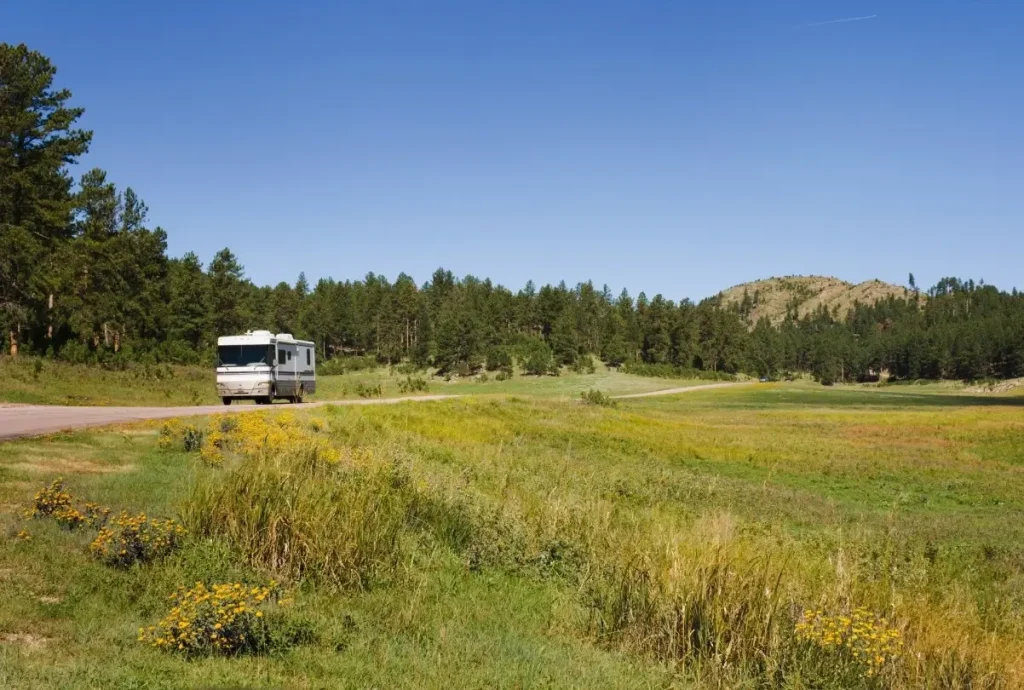
These states are more accommodating due to a combination of rural landscapes, smaller populations, and a cultural appreciation for alternative ways of living. (Not to mention that minimal and transient housing fits rural life well.) Many local governments in these areas recognize the practicality of RV living. They welcome the benefits it brings and so don’t enforce nearly as restrictive building codes—as long as you follow the local ordinances that are in place, you should be totally fine.
For detailed information on applicable laws in specific counties or cities, check out the local county offices managing zoning processes. Alternatively, some online resources like the Escapees RV Club or the FMCA (Family Motor Coach Association) blog have fantastic information for navigating the nuanced regulations of RV-friendly states.
But for the full list of states I consider great for living full-time in an RV, here you are!
- Alabama
- Alaska
- Arkansas
- Florida
- Mississippi
- Missouri
- Montana
- Nevada
- South Dakota
- Texas
- Wyoming
States Where Living in an RV Full-Time Has Complications
Let’s move along to those delicious gray areas now. Some states are RV-friendly but by way of a patchwork of zoning laws and local regulations that make the process more complicated. These states often allow full-time RV residency in certain rural or unincorporated areas. HOWEVER, they also usually impose strict rules and penalties in cities and suburbs.
In states like Arizona, Colorado, and Michigan, living in an RV on your property full-time is possible. However, local authorities often view RVs as temporary dwellings rather than permanent homes. As such, they don’t meet residential building codes.
Take Arizona, for example. It’s a popular state for RV living thanks to its vast rural spaces and milder climates much better suited to winter RV living. However, many counties require permits to park an RV on your land for extended periods. Some will also demand proper wastewater hookups, running water, or even full electrical systems to meet “habitable dwelling” standards.
Colorado, with its sweeping mountain vistas and iconic natural wonders, has similar issues. In rural counties like Park or Fremont, you might get away with full-time RV living if you play the bureaucracy game right. But you’ve got almost no chances in stricter urban areas.
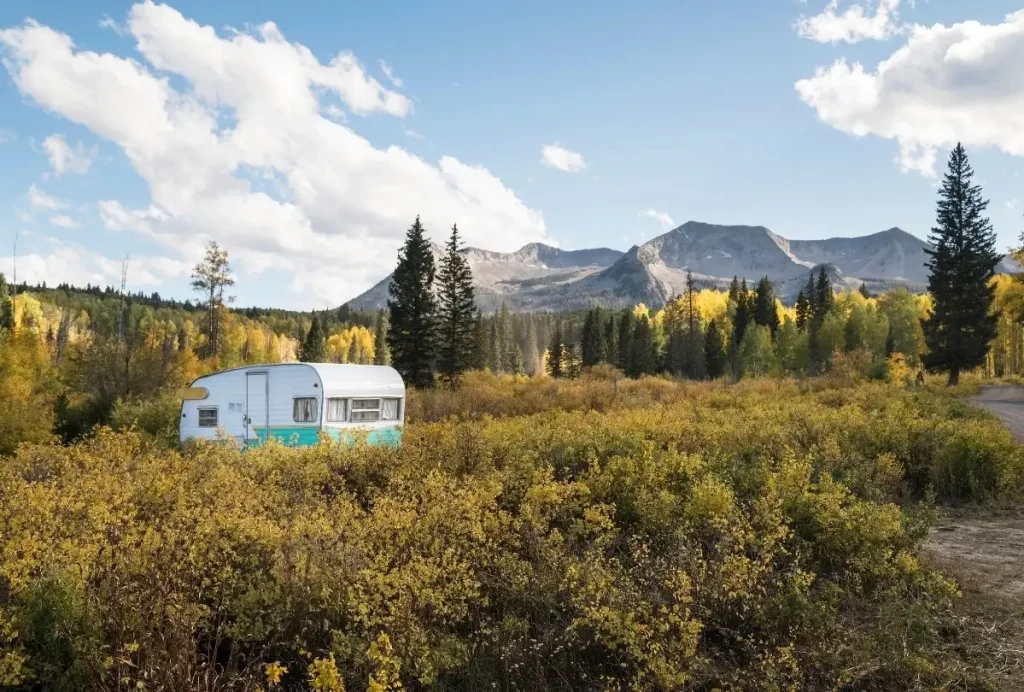
These complications often come down to:
- Utility hookups
- Waste management systems
- And minimum square footage requirements for permanent residences
You’ll have better luck scoping out rural counties like Idaho’s Boundary County or Oregon’s Josephine County. Areas like this where Libertarian values and self-sufficient living are more celebrated will give you the best options.
Lastly, resources like the county zoning ordinances listed on local government websites or online tools like LandSearch can help identify areas where these rules might be easier to navigate. Always double-check utility requirements and other restrictions first. Assess the long-term feasibility of your setup before choosing to settle in these states!
Here’s the full list of cheeky grey areas.
- Arizona
- Colorado
- Georgia
- Idaho
- Indiana
- Iowa
- Kansas
- Kentucky
- Louisiana
- Maine
- Michigan
- Minnesota
- New Mexico
- North Carolina
- North Dakota
- Wisconsin
- Ohio
- Oklahoma
- Oregon
- Tennessee
- Utah
States Where Living in an RV on Your Property Full-Time is Usually a No-Go
And now we’re up to the no-gos! For many states, living full-time in an RV on your property is a hard no. You might find the odd regional exception. But generally, strict zoning laws and building codes that classify RVs as temporary dwellings are relatively all-encompassing statewide.
States like California, New York, and Connecticut are notorious for their stringent regulations against RVers. They often require a permanent structure to meet local definitions of “habitable housing”. (Which RVs are not!)
In states like Maryland, Massachusetts, and Delaware, zoning laws also tend to favor suburban and urban development. These properties are usually more hooked into the system than in RV-friendlier states. They don’t really embody the self-sufficiency of the RV lifestyle and leave little room for alternative living.
But there are those exceptions! For example, in parts of California, like Siskiyou or Lassen counties, areas are more lenient. This goes double if you own a larger property and meet the basic utility requirements (i.e. fully self-contained, on-board kitchen, top-notch RV toilet system, etcetera).

But exceptions aside, these most restrictive states usually require RVs to be parked in designated campgrounds or mobile home parks. You might find exceptions exist for short-term stays or seasonal use. But any long-term living often means wading through a lot of red tape.
Personally, I’d say just leave these states off the table entirely. Take the message they’re sending, your taxes, and your good vibes to somewhere that wants you!
But if you’re determined to make it work, the key is targeting rural and unincorporated areas. Also, looking into accessory dwelling unit (ADU) laws. These sometimes allow RVs as temporary residences. Resources like the RVIA (Recreational Vehicle Industry Association) or local land use boards can help you navigate the restrictions of the fun-police states a bit more easily.
Here’s the full list of states I recommend avoiding for permanent RV-living!
- California
- Connecticut
- Delaware
- Hawaii
- Illinois
- Maryland
- Massachusetts
- Nebraska
- New Hampshire
- New Jersey
- New York
- Pennsylvania
- Rhode Island
- South Carolina
- Vermont
- Virginia
- Washington
- West Virginia
All about Zoning Laws
Ok! Back to those pesky zoning laws.
Zoning laws (a sub-category of local ordinances) are essentially the rulebook for how you can use land. As such, they’re a crucial consideration for anyone dreaming of full-time RV living on their property.
These laws are governed and regulated by local governments—cities, counties, or municipalities. Zoning laws decide whether a piece of land is for residential, commercial, agricultural, or mixed-use. For example, commercial buildings in commercially zoned areas will have different rules from residentially zoned ones.
While state laws set broader regulations, zoning is localized. This means the rules in one town might differ completely from the next one over. This is why I push for examining your ideal nesting local at the micro, local level-
Zoning laws are one of the biggest obstacles between you and that slower, more self-sufficient way of RV life.

Many areas classify RVs as temporary dwellings. That means you can only park and live in them on your property for short periods (but not full-time). Some local authorities might even prohibit parking an RV on a residential property altogether. Additionally, utility requirements, such as onsite sewage systems and potable water hookups, often force RVs to meet the standards designed for permanent homes.
Code violations aren’t something you want to risk either. Penalties can range from fines and eviction notices to full-blown lawsuits demanding compliance. Worse, your property could be deemed “uninhabitable”, leaving you in a legal quagmire.
It’s neither fair nor reasonable, but then neither is life. Sometimes it’s legitimately about health or safety hazards, but at other times it is admittedly about keeping suburbia suburban. Either way, unfortunately, to play the long-term game of living in an RV on your own property, you’ll need to play their game first!
Always check the local zoning laws. And wherever possible, look for permits and variances that allow you to live in your RV in otherwise restricted areas.
Or, just winterize your RV and go to Alaska. There are fewer people, less baloney, and self-sufficiency just kinda comes with the territory.
Game respects game!
Class A is the Way to Go
We’ve discussed a lot of the whats. Now for the how! If you’re serious about living the full-time RV life on private property, Class A RVs are the gold standard for good reason.
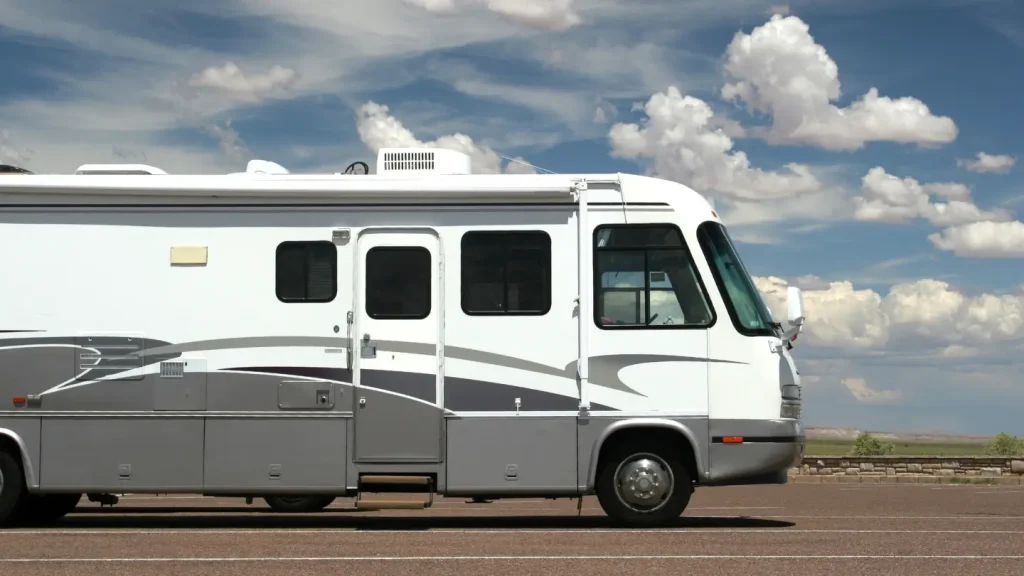
These motorhomes are designed with long-term comfort and functionality in mind. They offer residential-level features like full kitchens, spacious bathrooms, and even washer-dryer hookups.
There’s also a more practical reason to opt for Class As over other models and types of RVs too. (Or at least, in the context of navigating local regulations.) Their size and built-in utility hookups often make it easier to meet various utility-focused zoning requisites as well as pass any required safety inspections.
This includes zoning restrictions on…
- Waste management services and systems
- Water connections and plumping systems
- And electrical hookups
Many Class A RVs come pre-equipped with high-capacity tanks for fresh water and waste. You might still need to tinker with or upgrade some components. But a high-level Class A will often meet utility standards a lot easier than smaller rigs.
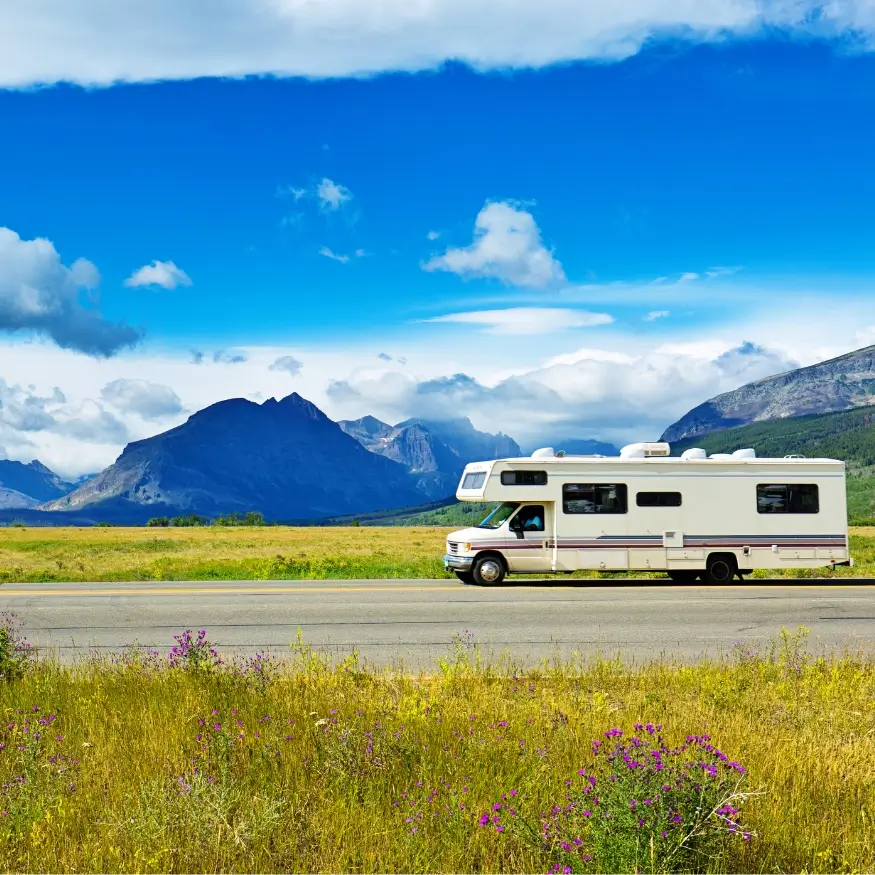
PLUS all that high-end design is much better equipped for the climates you’ll be living in. Class A’s often utilize insulated construction and HVAC systems that handle extreme weather better. From the scorching summers of Florida to the bone-chilling winters in Montana, Class A’s are much better suited for the full climate spectrum of the adventurous lifestyle.
On the downside, Class A RVs are super pricey! They’re also big and bulky, making them a hassle to park or maneuver. Annnnd they require diligent maintenance practices. This is both for their more complex systems as well as staying abreast of compliance matters.
So, yes: there’s a cost-benefit analysis. Prices, maintenance, and space concerns may put a dampener on your offbeat dreams of slower living. However, that’s just also part of the game. If you want no-frills, shoe-string living, choose a van and convert it into a camper.
But if you want comfort, Class A is the way to go. If you’re really committed to a long-term RV life with the stability of settling in one place, Class A RVs are the perfect merger of the home and motor-home lifestyles.
How Long Can You Stay?
Again, that really comes down to zoning laws. Those rules vary dramatically!
In many areas, the limit on RV stays is between 30 to 90 days. RVs are often classified as temporary dwellings. As such, authorities are generally expecting you to move along in reasonable timeframes.
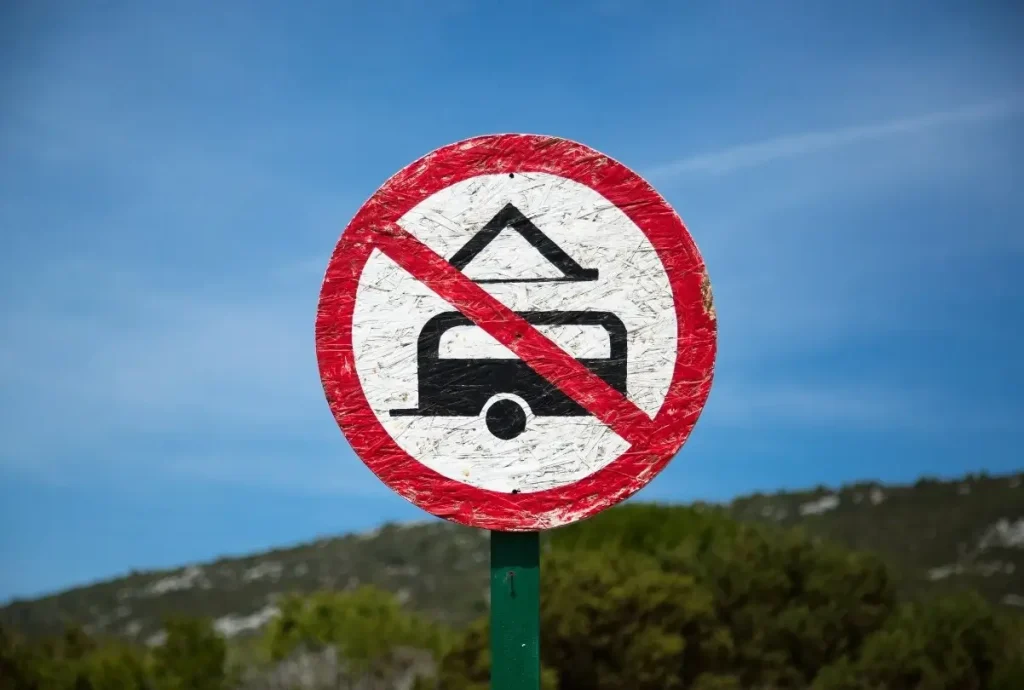
In more RV-friendly states or rural counties, you’ll find more leniency. Especially in unincorporated areas. But while longer or absent time restrictions are around, I would never recommend taking a gamble on it without properly researching the area first.
There are a number of ways these local regulations are usually enforced:
- Code inspections
- Complaints from neighbors
- Anonymous reporting
- Routine land-use checks by zoning officers
- And even aerial imagery
Meanwhile, code violations can result in fines or even orders for property owners to vacate.
That’s why, if you’re bending a few rules, go sparse and desolate. Aim for places where there aren’t many authorities around and not enough public funding to be sniffing out every oddball. That way, there’s more chance of being left alone.
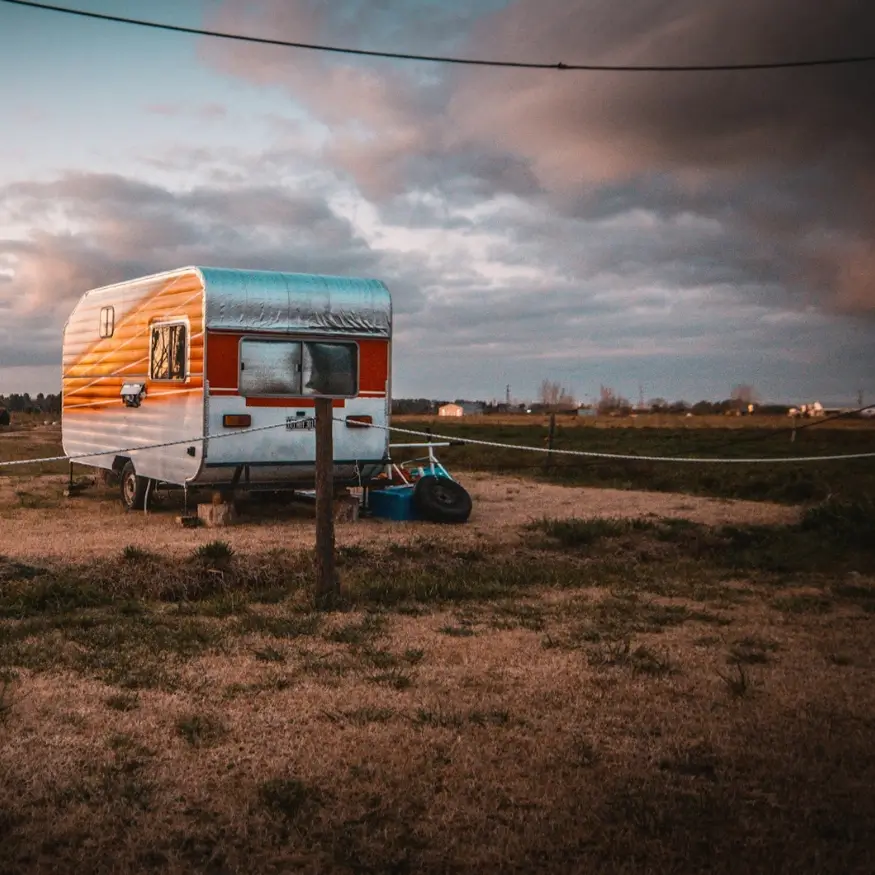
And for the same reason, rural areas are perfect! They’re much warmer to people living life on their own merit. Moreover, local communities on average almost possess an unwritten respect for self-sufficient, city-less living. These areas are also more likely to have permits or variances that can extend your stay.
For places with little to no restrictions, here are a few gems:
- Texas (rural counties)
- South Dakota
- Montana
- Nevada (unincorporated areas)
- Florida (some rural regions)
In these spots, long-term and full-time RV living is not only allowed but quite embraced. Just ensure your setup doesn’t attract complaints. Ensure your RV has all the gadgets it needs to be self-sufficient and sustainable, and respect whatever local guidelines are in place.
If you are going to commit to integrating with rural communities and lifestyles, it’s best to practice a ‘live and let live’ philosophy.
Conclusion
Okelie-dokie, motorhomies! How goes the rabbit-hole-ing? One more time…
What states allow you to live in an RV on your property?
The bottom line is that it’s complicated. Just like any good situationship, no matter how good the canoodling is, if the values and needs aren’t aligned (or in this case, the local laws and zonings), kick ‘em to the curb!
My picks? Well, South Dakota sounds dreamy and Alaska has been on my radar for a long time. But then, I’m also one of those weirdos who likes the cold!
If you’re looking for sunny climes, Texas or Florida might suit you better. Again, look for those rural counties. But one way or another, despite the trappings of control, it IS possible to live a stable, full-time RV life in the USA without committing to trailer parks. (Although, admittedly, travel trailers and fifth wheels offer a solid alternative to Class As on tighter budgets.)
Just remember to be cool about it though. Particularly if you’re migrating from the city. Rural living requires a different sort of mindset: it takes all kinds to build a village.
Come as you are, but don’t mess up what’s already there. Integrate and make friends, even the challenging ones. They too have their story.
Out there, it’s live and let live. And I promise if you show up with a good smile and an open heart, it might take some time…
But you will find the place that you and your RV can finally call home.
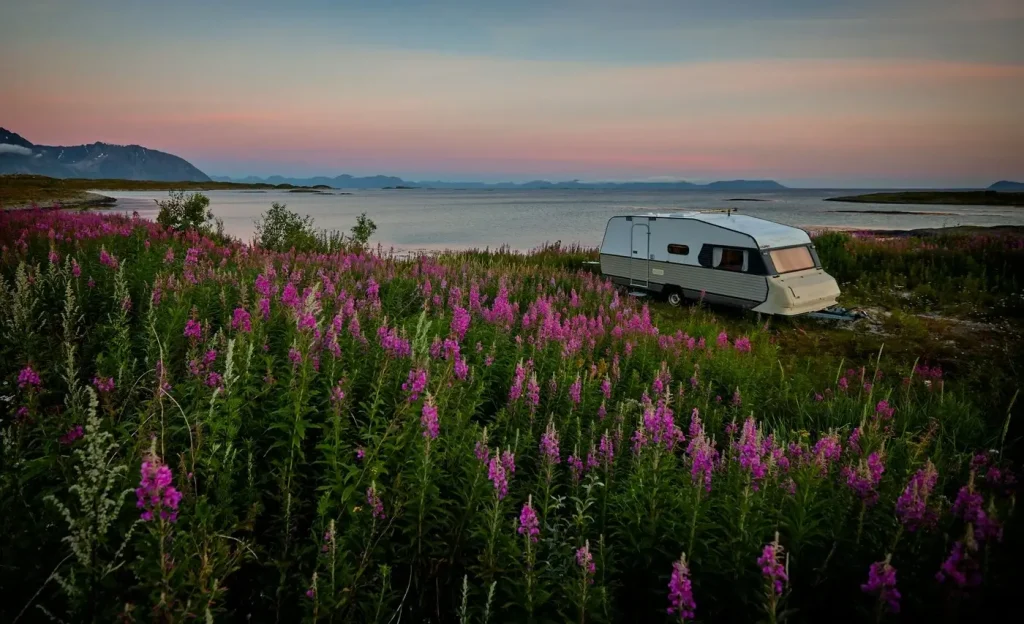

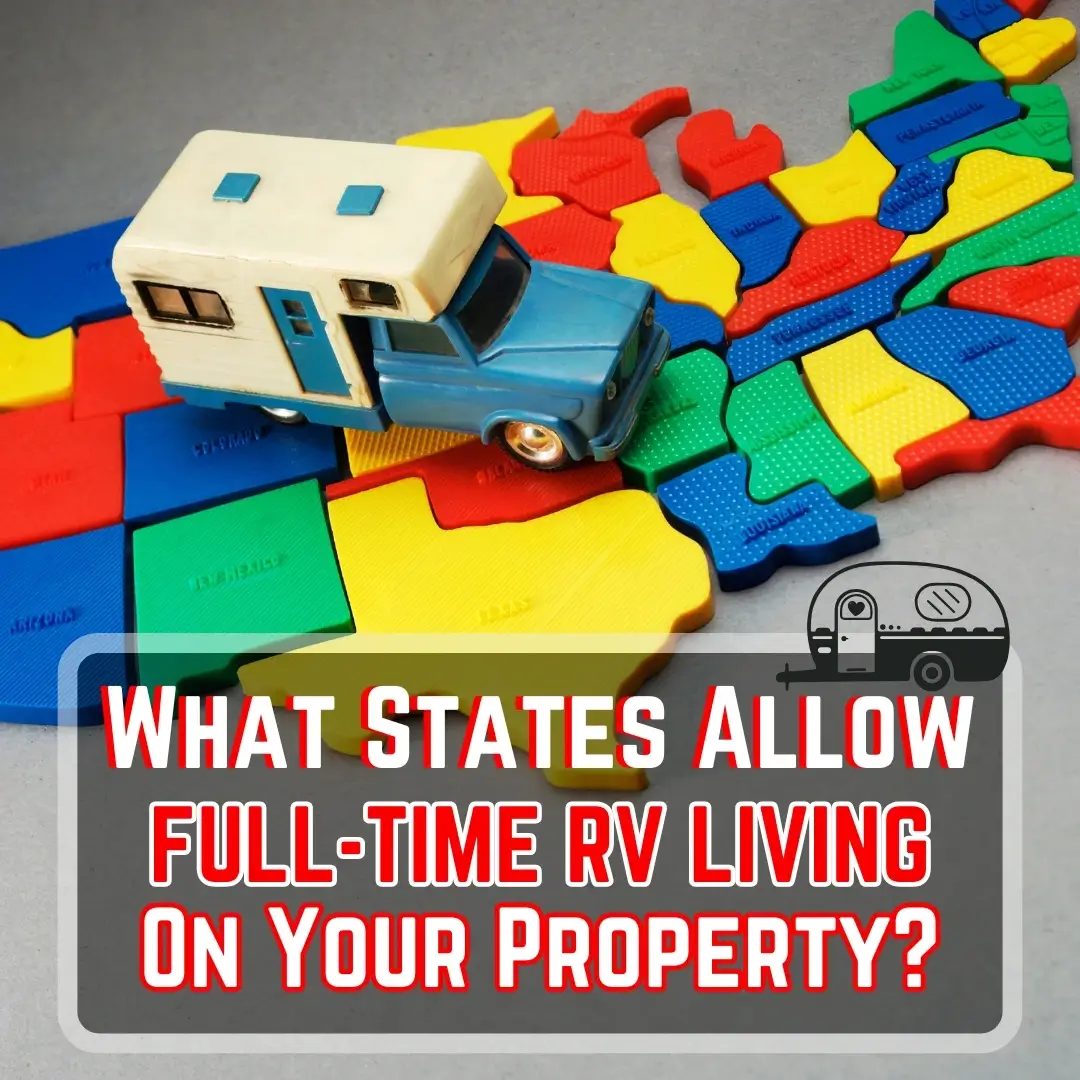
Very helpful website.
I live in Palm Springs, Florida.
I am coming up to retirement. I still have a mortgage payment to make for a while so the idea of me living in my back garden in my comfy C Class and rent my house out makes sense. I can also travel as well
I have it already connected up to water, power and mains drainage. purely for saving on storage costs.
Any tips for forward planning would be helpful.
Thank you
Chris
Hey Chris, that sounds like a great idea if you can make it happen! It will really come down to the regulations in your local area, but if it’s all allowed, then that’s a very frugal and savvy idea 🙂
What I’d recommend is to start off by checking in with your local zoning or code enforcement office in Palm Springs. First, double-check your plan and execution is compliant with zoning laws regarding long-term RV living on your property as well as and any regulations governing landlords living on the same property as their tenants. You may also want to double-cheeck that there are no extra tax implications to manage. That’s not the whole process, but if you head down and speak to the right professionals in your local area (or potentially even other local residents doing similar things), you’ll find some good info and practical support to get everything started.
Wishing you smooth travels and a stress-free setup!